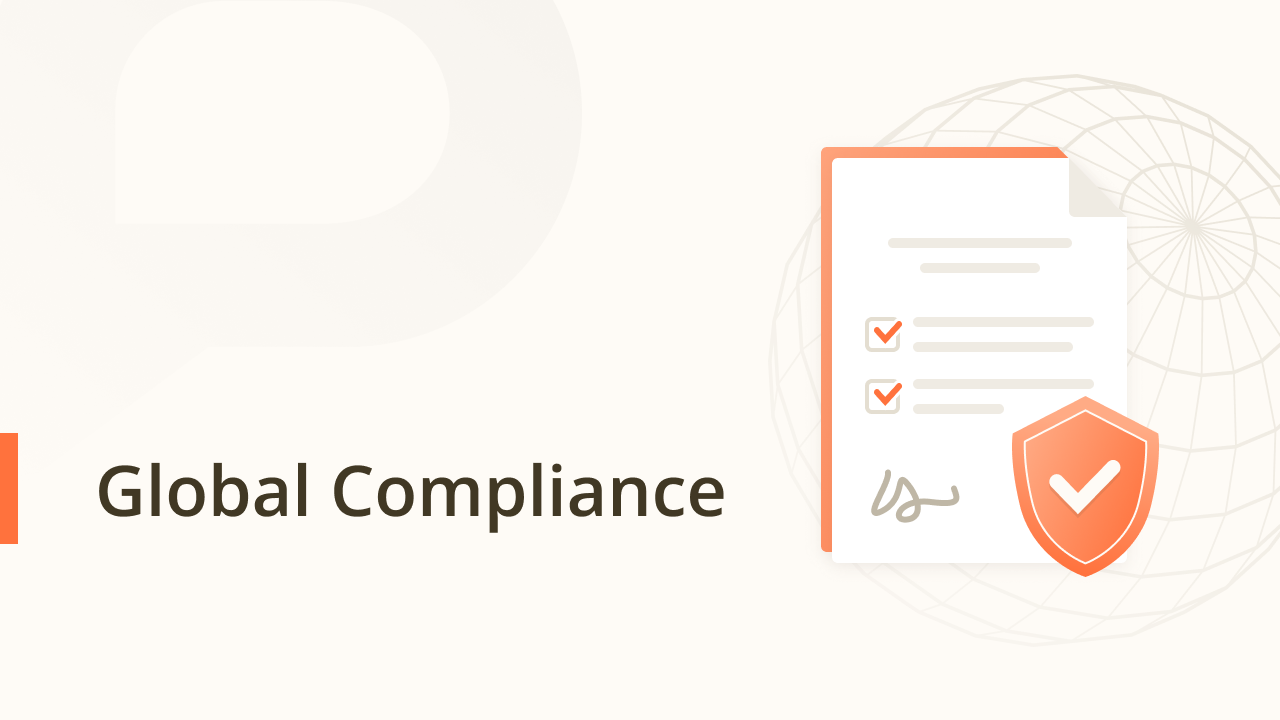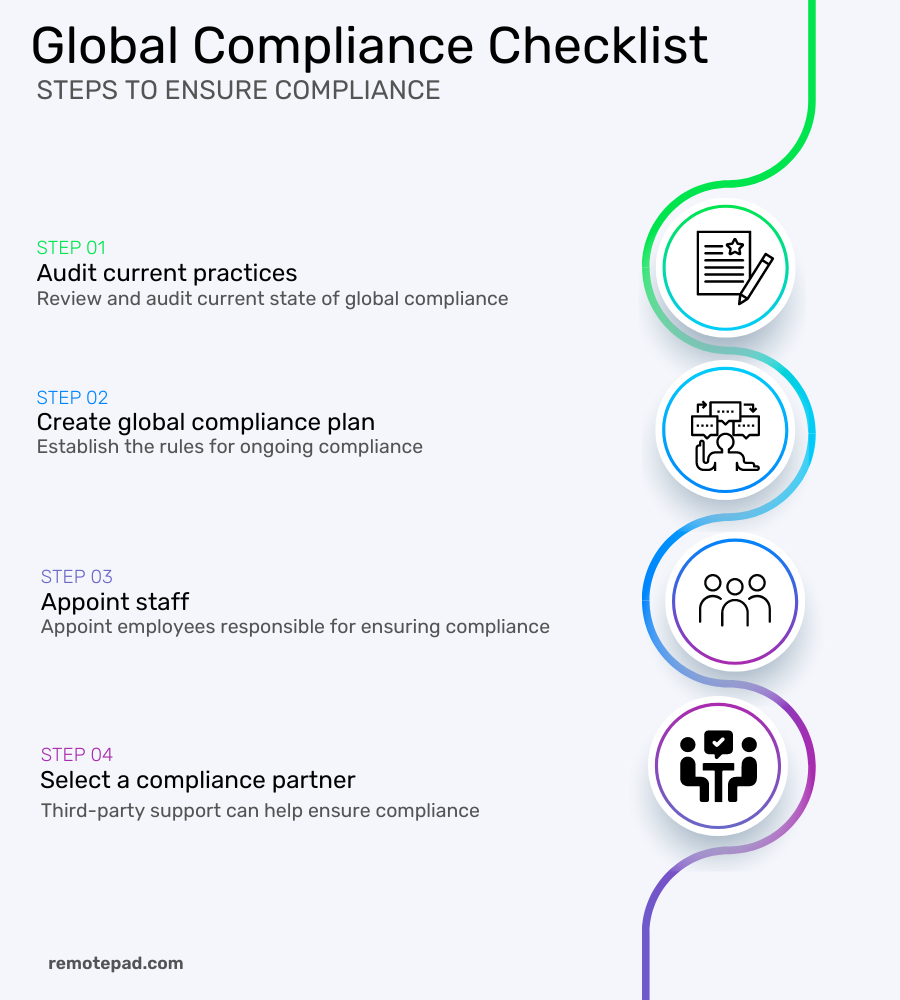Spending too much on recruitment, payroll or global HR?
We help you find the Best Providers at the lowest cost.
Key points
- Global compliance refers to an organization following all the laws, rules, standards and regulations that apply its global operations.
- Common global compliance rules include, but are not limited to, organizational compliance with tax, accounting, financial reporting, trade, equal opportunity, anti-money laundering, data protection and product quality standards and laws.
- Non-compliance with international requirements has severe consequences and can lead to contract breaches, hefty fines and penalties, and reputational damage.
- Organizations can meet global compliance requirements by auditing their current business processes, creating global compliance plans, appointing responsible compliance staff and engaging a global compliance partner.
In today’s complex regulatory environment, it is essential for organizations that operate across different geographical jurisdictions to have a well-managed global compliance program. Given the rise in remote employment and borderless working strategies over the past few years, global compliance for both small and large businesses has become an increasingly important factor to consider to ensure business operations run as smoothly as possible. While entering new markets and expanding business ventures across borders can be an exciting prospect, it can also provide compliance headaches.
This article will demystify global compliance and explain why it’s necessary to implement it in your organization. It will also review some of the common global compliance rules and best practices to ensure your organization can stay compliant while doing business across borders.
What is Global Compliance?
Put simply, global compliance refers to an organization following all the laws, rules, standards, and regulations that apply to its global operations.
Global compliance includes:
- Legal compliance — when organizations decide to operate globally, it is essential to operate in compliance with the local laws and rules that apply in each jurisdiction. Employment, immigration, and commercial laws can vary significantly between locations and organizations must be aware of, and follow, those different local rules and regulations.
- Compliance with global standards — some compliance rules apply globally, regardless of the location. For example, the same data protection, product standards, and financial payment rules can be applicable across different international borders. These are not necessarily incorporated into the law of the country where the company operates, but apply voluntarily due to the company signing up to them or choosing to operate in a location.
Although local rules can vary significantly between jurisdictions, there are commonalities between many international compliance areas. We explore the most common global compliance rules and regulations in the next section.
Common global compliance rules
Common areas of global compliance include:
- Tax compliance — This refers to the obligation of organizations to pay taxes in the countries in which they are operating. Tax rates and methods of payment can vary significantly between countries, and it is important to be aware that taxes may apply to any organization that is established in another country. We note this can be even more complicated for organizations that have employees on international assignments. This is because tax withholding requirements may be applicable in both the employee’s home country and the one they are working in. We have covered this topic in detail in our guide to ‘shadow payroll’.
- Global trade compliance — there are extensive rules related to importing and/or exporting goods and services. Organizations must be aware of rules that cover export controls, tariffs, permits, licenses, customers and the valuation of goods. Read more about this in our complete guide to managing trade compliance.
- Anti-money laundering rules — Most countries enforce strict rules and regulations related to anti-money laundering and counter-terrorism financing (AML/CTF). These rules require organizations to develop programs that: report appropriate information to regulators, monitor large transactions, and train employees in identifying and protecting against breaches of AML/CTF rules.
- Accounting and financial reporting standards — although procedures can vary between countries, financial statements of a company are usually required to be prepared in adherence to certain standards. The International Financial Reporting Standards (IFRS) are a set of standardized principles and rules for preparing and presenting financial information. The IFRS, along with the International Accounting Standards (IAS) have been adopted by many countries globally to ensure information is presented consistently between jurisdictions and in a compliant manner. Note that IFRS does not apply everywhere — in the United States, for example, the Generally Accepted Accounting Principles (GAAP) are applied instead of the IFRS.
- Product quality standards — various standards apply to international products and services that organizations must be aware of. These are generally developed by international bodies, like the International Organization for Standardization (ISO) to ensure consumers receive quality and consistency in the products and services they are provided. For example, product quality standards ensure an AA or AAA battery is the same size, regardless of where it is manufactured. Although in many countries adhering to these standards may not be required by law, it can often be required by contracts and licenses. Failing to comply with these standards can result in a breach of contract, and the organization may be liable to pay damages or penalties.
- Data protection regulations — abiding by data protection laws is one of the most significant global compliance obligations of organizations operating across jurisdictions. Two of the most common data protection regulations applicable to businesses are the European Union’s (EU) General Data Protection Regulation (GDPR) and California’s California Consumer Privacy Act (CCPA). The GDPR applies to organizations based in the EU, or based outside the EU and doing business with EU consumers. Therefore, for most global companies, consideration of the GDPR is essential. You can click here to find out more about the GDPR and how it may impact your business operations.
Why is global compliance necessary?
Compliance is a vital part of international business expansion and operation. It is required by organizations to reduce the risk of fines, penalties, and reputational damage of non-compliance, and assists business operations to run smoothly. We have outlined some of the potential fallout from non-compliance below:
- International reputation — failure to implement stringent global compliance policies and procedures can result in damage to an organization’s brand both locally and abroad. This can limit business opportunities and expansion prospects for an organization.
- Fines, penalties, and risk of imprisonment — hefty fines, penalties, and even imprisonment can be applied to organizations or individuals that breach some of the global compliance rules. These fines can be debilitating to organizations and stop scale and growth potential in different jurisdictions.
- Potential loss of licenses and permits — non-compliance with laws and regulations can result in the loss of a license required to operate in that industry.
Although these consequences can be severe, the next section details best practices for global compliance, which can assist in mitigating some of the risk areas discussed above.
Best practices for global compliance
Organizations that operate across borders require proper compliance methods and processes to ensure they can continue to grow and expand. Below we outline four steps businesses can take to ensure the best global compliance practices:
- Audit current business processes — review your current business practices and policies to ensure they incorporate the relevant global compliance rules for the countries you are operating. Further to this, business practices should be the subject of regular and periodic audits to ensure you are meeting compliance obligations.
- Create a global compliance plan — establish a standardized framework or plan to apply when setting up operations in a new location to ensure a consistent approach to becoming globally compliant. This should also include a communication and/or training plan for employees in the new location.
- Appoint staff responsible for global compliance — delegate global compliance-related duties to specifically trained employees. This can help to ensure compliance and embed consistent protocols within the organization. These employees are usually also responsible for internal compliance monitoring procedures, reporting compliance issues to management, and keeping up with global compliance changes as they occur and communicating them accordingly.
- Join forces with a global compliance partner — There are several organizations and partners that businesses can work with that specialize in global compliance laws. Reputable partners can assist in navigating complex regulatory areas in new jurisdictions. These can include specialists in payroll and tax law, employee entitlements, work permits and visas, business regulations, and product quality laws, or full-service providers such as global Professional Employer Organizations (global PEOs).
Your global compliance checklist
Global compliance — managing it effectively
Global compliance is an essential component of an organization’s operations when expanding abroad. It enables employees to be onboarded and managed appropriately and according to both local and international rules and regulations. Implementing proper compliance protocols and processes can help businesses run smoothly and seamlessly expand into new markets. Proper compliance management for multinational employers can also reduce the risk of fines, penalties and reputational damage.
Due to the ever-evolving nature of global regulation, compliance matters can be complicated to manage. While currently there is no standard solution for managing global compliance, this article provides a framework to assist in navigating the complexity of the global compliance landscape, and grow your business compliantly across borders.
FAQ
The purpose of global compliance is to manage an organization’s compliance, regulatory and reputational risk by ensuring adherence to the applicable rules, regulations and laws in the jurisdictions it operates within.
Businesses that fail to manage global compliance appropriately can face hefty fines and penalties, contract breaches, imprisonment, revocations of licenses and severe reputational damage. These risks can be managed by implementing good compliance protocols and practices.



